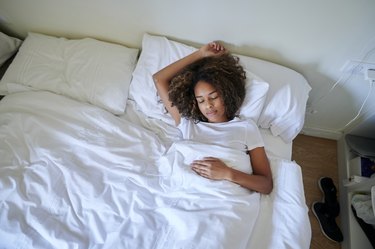
Sleep struggles are a common problem (about 1 in 3 American adults don't get enough zzzs every day, per the Centers for Disease Control and Prevention). To get better shut-eye, many folks are turning to magnesium spray for sleep as a quick, natural fix.
This trendy mist promises to relax muscles, calm the mind and help you drift off faster — all with just a few spritzes on your skin. But does it really work as a natural sleep aid, or is it just another overhyped social media craze?
Video of the Day
Video of the Day
Let's break down the science, the claims and discuss whether or not you should keep a bottle of magnesium spray on your nightstand.
Magnesium and Sleep: What’s the Connection?
Magnesium is a powerhouse mineral that keeps your body running smoothly. It supports nerve function, helps with muscle relaxation and aids in the production of melatonin, the hormone that controls your sleep-wake cycle, says Thomas Kilkenny, DO, director of the Institute of Sleep Medicine at Northwell Staten Island University Hospital.
It's also essential for DNA and protein synthesis, reproduction and overall cellular health, Dr. Kilkenny adds.
When magnesium levels dip too low, you might find yourself tossing and turning, waking up too early or feeling more stressed and restless at night, Dr. Kilkenny says. Research shows that higher magnesium levels are linked to better sleep, longer rest and improved daytime energy.
A February 2022 systematic review in Biological Trace Element Research found a link between magnesium levels and sleep quality (including sleep duration, snoring and daytime sleepiness). But when looking at randomized clinical trials, the results on magnesium supplementation for sleep disorders were mixed.
Scientists are still figuring out the exact mechanisms, but experts believe magnesium influences key brain chemicals like GABA, melatonin, cortisol, NMDA and renin, all of which can affect relaxation and sleep quality.
So, how much do you need? The recommended dietary allowance for magnesium is 310 to 420 milligrams per day for adults, depending on age, sex and pregnancy status, according to the National Institutes of Health.
Oral vs. Topical Magnesium: Which Works Best?
You can get magnesium through food, supplements or even via skin application. Foods high in magnesium include spinach; many beans and legumes, including black beans and lentils; and many nuts and seeds, including pumpkin seeds, almonds and flaxseeds.
While oral magnesium supplements are common and relatively safe, they can cause bloating, diarrhea or stomach discomfort in some people, Dr. Kilkenny says.
Magnesium spray offers an alternative by skipping the digestive system and absorbing through the skin — but scientific backing is limited, Dr. Kilkenny says. Some people swear by it for muscle relaxation and better sleep, but experts say more research is needed to confirm its full effectiveness.
Does Magnesium Spray Actually Work?
Studies show that taking magnesium by mouth may improve sleep quality, help regulate circadian rhythms and reduce daytime drowsiness, Dr. Kilkenny says. However, the clinical evidence for transdermal (skin) absorption is currently lacking, he says. Still, many users report that magnesium spray helps them sleep better, likely due to its muscle-relaxing effects.
Again, more studies are needed to confirm if magnesium spray is an effective sleep aid. In the meantime, it might be worth a try if you prefer to avoid oral supplements.
Possible Side Effects of Magnesium Spray
For most people, "magnesium spray is generally safe, but some may experience mild skin irritation, tingling or a temporary burning sensation," especially on broken or sensitive skin, Dr. Kilkenny says. If that happens, try rinsing the area with water or diluting the spray, he adds.
It's always a good idea to run any concerns or questions by your health care provider before you start using a new supplement.
How to Choose the Right Magnesium Spray
Not all magnesium sprays are created equal. When shopping, Dr. Kilkenny recommends you look for:
- Magnesium source: Magnesium chloride is the most recommended for better absorption.
- Purity: Choose products free from artificial additives or unnecessary chemicals. In other words, magnesium should be the only ingredient or one of just a few.
- Third-party testing: Opt for brands that are independently tested for safety and quality. These typically have a seal on the bottle or on the brand's website. Common third-party testers include USP and NSF.
How to Use Magnesium Spray for Better Sleep
For the best results, apply magnesium spray to clean, dry skin before bed. Follow these simple tips, courtesy of Dr. Kilkenny:
- Target key areas: Spray it on your legs, arms or feet for easy absorption.
- Let it absorb: Leave it on for at least 20 minutes before rinsing (if needed).
- Use it nightly: Consistency is key for noticeable effects.
- Avoid sensitive areas: Don't apply to cracked, inflamed or broken skin.
- Combat dryness: If you experience tingling or dryness, follow up with a moisturizer.
- Stop use if irritation occurs: If you have a severe reaction, discontinue use and consult a health care professional.
Natural Alternatives to Magnesium Spray
If magnesium spray isn't your thing, here are other natural ways to boost magnesium levels and improve sleep, according to Dr. Kilkenny:
1. Get More Magnesium in Your Diet
Eat magnesium-rich foods like spinach, nuts, seeds and whole grains.
2. Soak in an Epsom Salt Bath
A warm bath with magnesium sulfate (Epsom salts) can help relax muscles and promote restful sleep.
3. Prioritize Healthy Sleep Habits
Good sleep hygiene is more effective for improving sleep than magnesium alone. Try these habits:
- Stick to a schedule: Wake up at the same time every day, even on weekends. Same goes for setting a consistent bedtime to train your body's internal clock.
- Limit naps: Keep naps short (20 to 30 minutes) and only in the early afternoon.
- Dim the lights: Avoid bright, blue light (from screens) in the evening, as it disrupts melatonin production.
- Ditch the screens: Power down electronics 30 to 60 minutes before bed for better relaxation.
The Bottom Line
Magnesium spray is an easy, natural option for better sleep. While research is still inconclusive, many users swear by it. If you're struggling with sleep, it might be worth a shot — just check with your doctor first.
Was this article helpful?
150 Characters Max
0/150
Thank you for sharing!
Thank you for your feedback!
Is this an emergency? If you are experiencing serious medical symptoms, please see the National Library of Medicine’s list of signs you need emergency medical attention or call 911.


